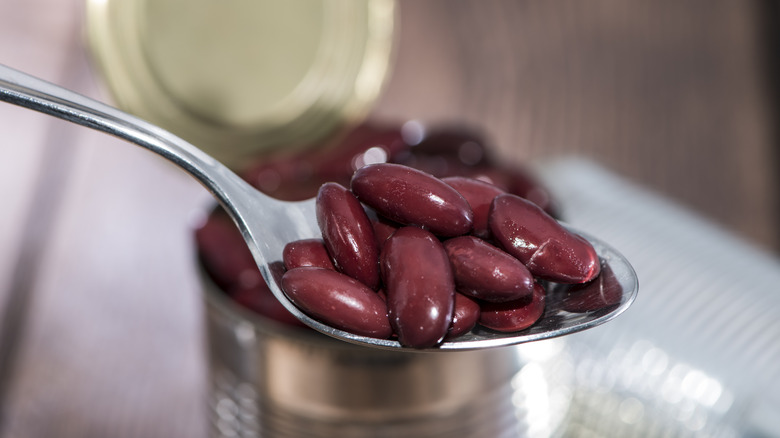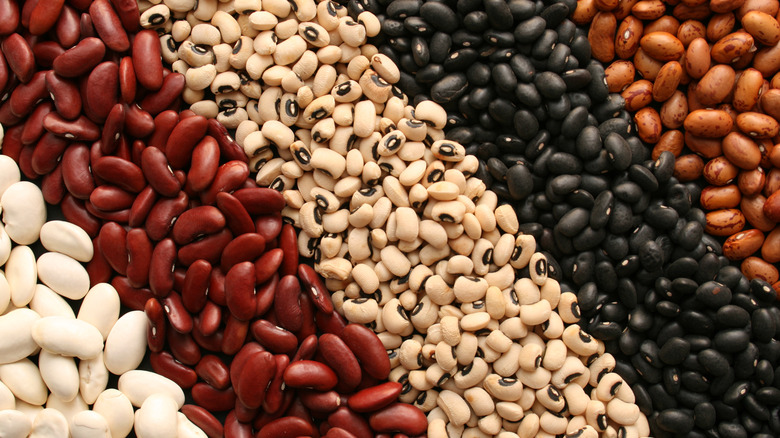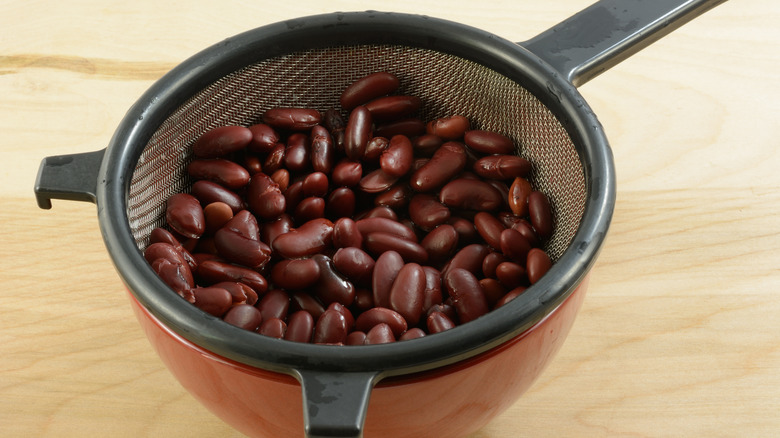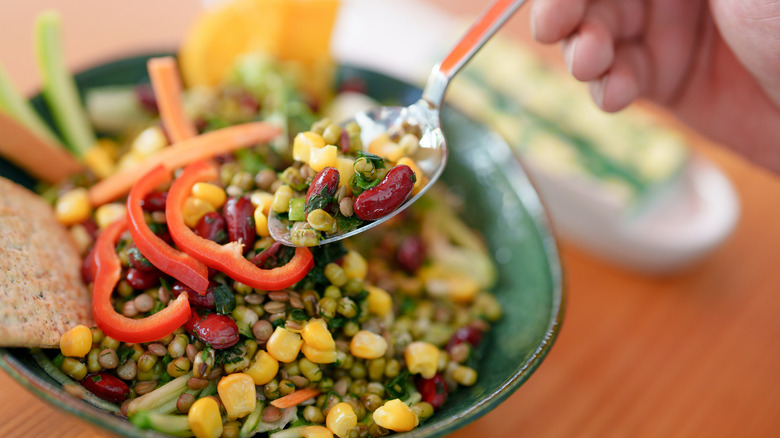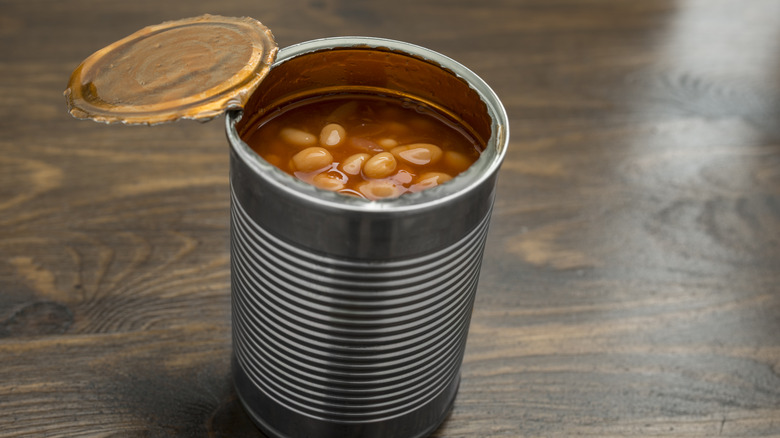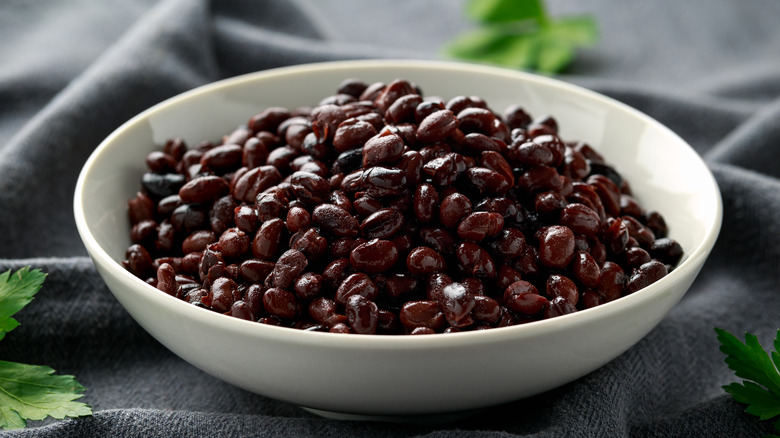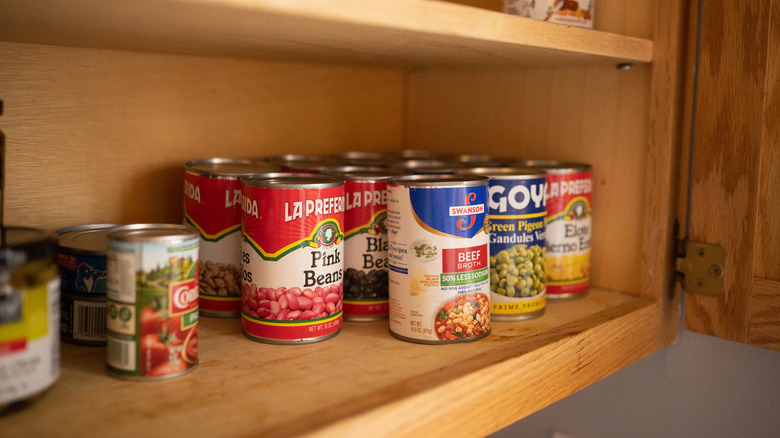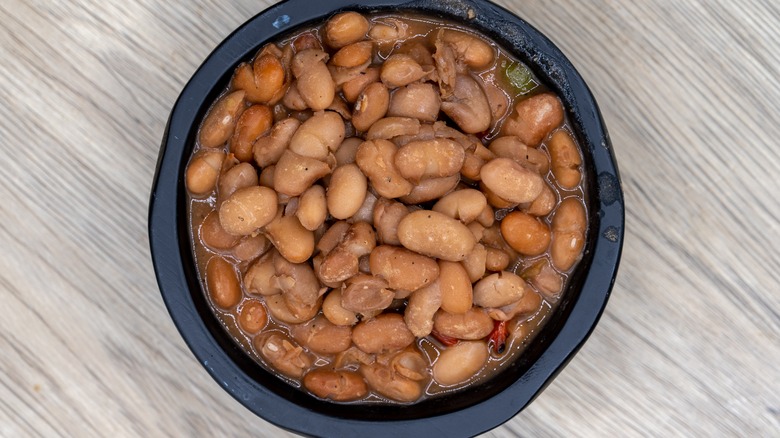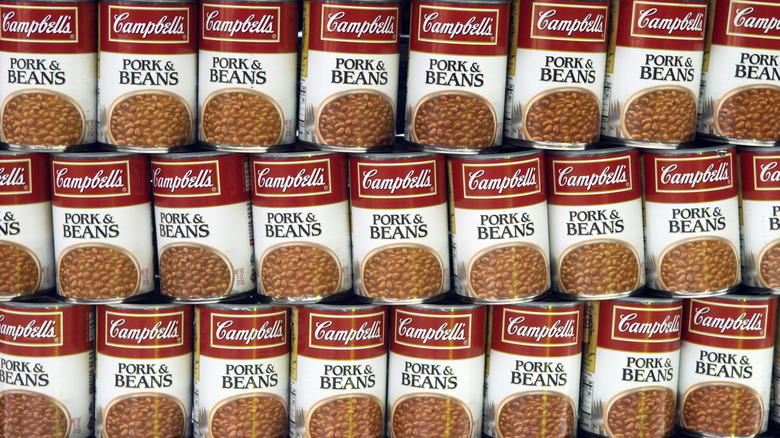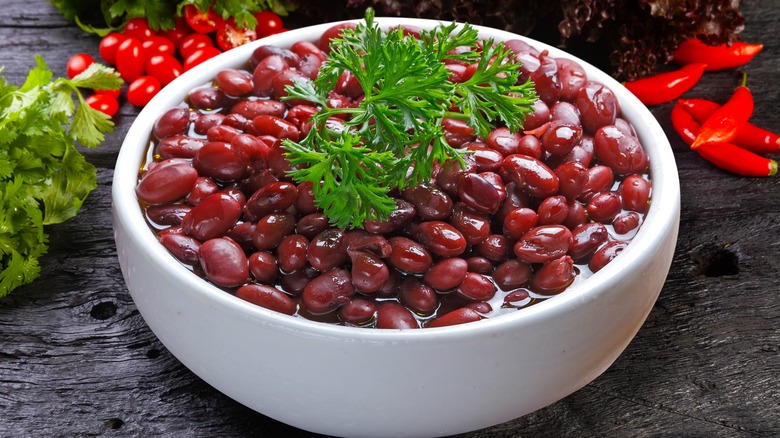11 Canned Bean Myths You Should Finally Stop Believing
There's a lot to like about beans. Among the most eco-friendly foods on the planet, beans are an eminently affordable and nutritionally sound option. Of course, while eating them may help you live longer, the fact remains that Americans tend to consume fewer beans than the rest of the world. The time and planning required to prepare a bag of dried beans may help explain why folks tend to avoid the food — but those issues don't exist with canned beans.
Like any convenience food, canned beans are there when you need them. Yet numerous home cooks throughout the U.S. tend to shun them. While there's likely a degree of dried bean snobbery at play among foodies, the reason many folks avoid canned beans may owe more to some commonly believed misconceptions among the general public. To help you overcome any inherent bias you may have towards this cheap and nutritious food item, here are 11 canned bean myths you should finally stop believing.
Canned beans cost more than dried
At first glance, this myth contains a kernel of truth. Dried beans are generally cheaper than canned varieties (particularly if you buy them in bulk), largely because of the additional processing involved with canning. However, the price difference between dried and canned beans is largely negligible. More than that, even if canned beans tend to cost more on average than dried varieties? Canned beans are still among the lowest-priced protein sources on the market.
Furthermore, while dried beans are cheaper to purchase than canned, the initial price doesn't necessarily represent the full cost. Since dried beans take longer to cook, you'll be expending additional energy and using more of your time — both of which are immensely valuable. The bottom line is you're more likely to increase your bean consumption if you merely need to open a can and heat the contents, so there's no reason to fret over a few extra pennies when buying canned beans.
They contain too much sodium
Many individuals keep a close eye on their sodium intake and avoid too many processed foods to help cut down on salt consumption. Food companies often rely on salt to ensure customers enjoy any processed offerings since salt makes food taste better (at least to a point). Now, while canned foods are often viewed as an inherently high-sodium option to avoid, well ... there's a reason why we have nutritional facts. Consequently, if you've avoided canned beans because you assumed the sodium levels were off the charts? You may want to double-check the label.
To be sure, some brands and varieties of canned beans are higher in sodium than others. But there are numerous reduced-sodium or "no salt added" canned bean options on store shelves, as well — meaning there are plenty of canned beans available to fit anyone's nutritional priorities.
Even if you hadn't thought to choose a low-sodium version when you purchased the can of beans in your pantry, you can still further reduce the salt content before eating. Since a substantial amount of sodium lingers in the liquid in each can, draining canned beans before heating them will help cut down on the salt level considerably.
Canned beans are less nutritious
Realistically, this is less of a myth than a failure of perspective. The persistent belief that canned foods are less nutritious than fresh varieties is hardly cut and dry. After all, vegetables that are canned and processed at their peak — often mere hours after harvest — retain much of their original nutritional value. Vegetables shipped to market while fresh, on the other hand, are apt to lose vitamins and nutrients with each passing day.
Now, beans and vegetables aren't exactly the same. In that sense, some evidence does indicate a modest nutritional difference exists in favor of dried beans versus canned. But the health benefits offered by bean consumption in any form — dried or canned — far outweigh any potential concerns about canned beans' diminished nutritional qualities.
Dried beans may technically be more nutrient-dense than canned beans. But seeing how the bean that's best for you is the one you'll eat more often? The simple convenience of canned beans is a winning factor, so don't avoid them out of health concerns.
You should always discard the liquid
Draining canned beans and discarding the internal cooking liquid is a fairly universal practice. Many recipes don't require it, after all, and dumping the liquid contents from a can of beans offers a quick way to cut down on the sodium level.
That being said, you should never get rid of the liquid from canned beans – and if you have the opportunity to use the liquid in a soup or sauce? You absolutely should. The liquid can help thicken while imparting additional seasoning and flavors. This is especially true if you're using canned beans with a specific flavor profile (think a "Southwest" variety made with cumin and chilies) as those will also carry over to your new dish.
The liquid from a can of chickpeas — known as aquafaba — is especially useful for anyone who follows a vegan diet. This canned bean liquid can be whipped into a surprisingly good foam that's used as a replacement for beaten egg whites in many recipes (including meringues). Even if you aren't a vegan yourself, you can have a lot of fun experimenting with aquafaba.
Canned beans are highly processed
The precise definition and impact of highly processed foods — including ultra-processed foods – has been hotly debated among nutrition professionals for some time. However, the takeaway for the general public has been fairly simple: processed foods are bad, and unprocessed, whole foods are good. Now, the genuine health concerns surrounding processed foods, including a link between ultra-processed foods and cancer risk, tend to place canned foods in a bad light. But if you've avoided canned beans in the past because they're an unmistakably processed product, that anxiety is misplaced.
The actual processing for canned bean production amounts to little more than cooking and flavoring them — much the same as you would at home. Additionally, the ingredient list for many quality canned bean brands almost invariably starts with beans, water, and salt, with many including nothing more than those items. Some varieties will add a little more flavor-wise, but as we've mentioned before: labels are your friend. So when you're looking for a minimally processed canned bean brand to buy, aim for beans with shorter lists of recognizable ingredients. That's all it takes.
Dried beans always taste better
Hearing foodies argue over their favorite ingredients can be amusing from the outside. After all, certain folks will work themselves into a frenzy and exhibit wine-snob levels of condescension over things most of us would never give a second thought — like the supposed superiority of dried beans.
Now, some people will assure you (at great length) that dried beans always taste better than a canned variety — especially if you're starting with heirloom beans from a premium supplier. But while a high-quality batch of dried beans will likely have a slightly more pleasant texture and taste than canned beans when prepared properly, there's no guarantee you'll end up with a perfectly cooked final product. For one thing, anyone who's cooked with dried beans before has likely encountered a bag filled with old, hard-as-rocks beans that never reached the desired texture.
Additionally, there are some risks involved with cooking dried beans — for instance, a batch of uncooked kidney beans can be toxic if ingested — that are mitigated when purchasing canned beans. Those issues won't happen with canned beans since they're always fully cooked and predictable from one can to the next. Frankly, it's no wonder some believe canned beans reign supreme over their dried counterparts.
Canned beans last forever
Beans have a reputation for being among the longest-keeping foods. Dried beans can technically remain edible for years if properly stored — though you may not enjoy eating them after a certain point. Canned beans can have a long and useful shelf life when stored correctly, as well. But sadly, it's not infinite.
Now, just how long your canned beans will last depends on several factors. The USDA suggests canned beans can remain safe and edible for up to five years, but in practice? Well-stored canned beans will stay good for as long as the cans remain intact. Corrosion and dents can weaken the seals and create a risk of air entering the cans and causing spoilage. Additionally, storing cans at extreme temperatures (both cold or hot) can cause a can's quality to quickly deteriorate and make its contents inedible.
If you aren't able to store canned beans in a temperature-stable environment, your best bet is to stick to the printed-on best-by dates. Since labels can sometimes get torn or become illegible, writing the can's use-by date directly on the side with a marker is a smart move. Also, organizing your pantry so the oldest products get used first (like at a restaurant) is an excellent habit to ensure you use canned beans while they last.
Beans in cans are always mushy
A close relative to the myth that dried beans always taste better, the notion that canned beans are uniformly mushy isn't entirely inaccurate. Then again, while some brands and varieties come up short texture-wise, the best canned bean brands invest the care necessary to produce a tender, creamy, and well-flavored final product that isn't overcooked.
Given the plethora of canned bean varieties likely available at your local grocery store, consider trying a few different brands to determine which is the best fit for your personal preferences. You can opt for a pricier can of premium imported beans on occasion, of course — particularly for a special recipe that demands the best. But you won't need to break the bank too often, and you can generally buy the brands that best fit your budget (and palate). Either way, remember the best beans are the ones you'll eat most often — and that's usually canned.
Canned beans have a lot of fat
One of the concerns you'll sometimes hear regarding the supposed unhealthiness of canned beans is their fat content. But seeing how beans are very low in fat as a general rule, it's clear this canned bean myth is wholly fictional.
Perhaps the reasoning behind this faux canned bean worry has less to do with the beans themselves and is more about how they're prepared. A can of plain pinto or kidney beans contains very little fat, of course — but that won't be the case with your average can of refried beans, chili with beans, or old-fashioned pork and beans. The culprit, then, clearly isn't the beans — it's the added ingredients that diminish the food's inherently healthy qualities.
There's a reason why refried beans rank among the worst canned foods you can buy. Even if they taste delicious, canned refried beans aren't a pillar of health. But that doesn't mean every variety of canned beans is nutritionally detrimental, so remember to look at a can's label if you're concerned about the fat content.
They're unhealthy because they have lectins
One of the recurring downsides of living in the social media age is the persistent viral scaremongering related to health and nutrition. Even if plenty of reliable sources can be found online (government and education sites are usually safe bets), they're often drowned out by unverifiable clickbait — like the notion that canned beans are unhealthy because beans contain lectins.
A class of proteins that bind to carbohydrates, lectins are found in many foods, including beans. While the specific type found in beans can cause your digestive system a lot of grief — they can even be lethal in high concentrations — you shouldn't be concerned about lectins in canned beans.
Why? Well, lectins are destroyed by cooking — it's the reason why it's important to properly cook legumes, after all. Since canned beans are always (by necessity) fully cooked, you can rest assured knowing you won't experience any lectin-driven digestive distress when you choose canned beans.
Canned beans hit your digestive system like a bomb
Some people may be understandably concerned about the potential (ahem) repercussions of eating beans. Aside from their legendary (and not entirely mythical) ability to promote flatulence, beans also have a reputation for sending you to the bathroom. However, while a couple of factors contribute to the belief that canned (or dried) beans are a digestive grenade, you shouldn't avoid canned beans entirely because of this concern.
Now, beans do, in fact, contain indigestible carbohydrates (called oligosaccharides) that pass through your digestive system and arrive unharmed at the colon. While the good news is that this process feeds beneficial bacteria in your gut, the bad news is this can also cause gas. Additionally, beans contain a substantial amount of soluble and insoluble fiber, which can cause digestive trouble when ingested in high quantities.
Still, considering many Americans don't get enough fiber in their diet, it may be worth slowly increasing your bean consumption – rather than jumping right in — to reduce the risk of bloating. With additional ways to cut down on gassiness, such as picking up a bottle of Beano, there's no reason to assume canned beans will automatically tie your stomach in knots.
